- Home
- Stephanie Laurens
The Tempting of Thomas Carrick
The Tempting of Thomas Carrick Read online
The Tempting of Thomas Carrick
A Cynster Next Generation Novel
STEPHANIE LAURENS
This e-book is licensed to you for your personal enjoyment only.
This e-book may not be sold, shared, or given away.
This is a work of fiction. Names, characters, places, and incidents are either products of the writer’s imagination or are used fictitiously and are not to be construed as real. Any resemblance to actual events, locales, organizations, or persons, living or dead, is entirely coincidental.
THE TEMPTING OF THOMAS CARRICK
Copyright © 2015 by Savdek Management Proprietary Limited
ISBN: 978-0-9922789-7-7
Cover design by Savdek Management Pty. Ltd.
Cover and inside front couple photography and photographic composition
by Period Images © 2015
ALL RIGHTS RESERVED.
No part of this work may be used, reproduced, or transmitted in any form or by any means, electronic or mechanical, without prior permission in writing from the publisher, except in the case of brief quotations embodied in critical articles or reviews.
First electronic publication: March 2015
Savdek Management Proprietary Limited, Melbourne, Australia.
www.stephanielaurens.com
Email: [email protected]
The names Stephanie Laurens and the Cynsters are registered trademarks of Savdek Management Proprietary Ltd.
Do you believe in fate? Do you believe in passion? What happens when fate and passion collide?
Do you believe in love? What happens when fate, passion, and love combine?
This. This…
#1 New York Times bestselling author Stephanie Laurens returns to Scotland with a tale of two lovers irrevocably linked by destiny and passion.
Thomas Carrick is a gentleman driven to control all aspects of his life. As the wealthy owner of Carrick Enterprises, located in bustling Glasgow, he is one of that city’s most eligible bachelors and fully intends to select an appropriate wife from the many young ladies paraded before him. He wants to take that necessary next step along his self-determined path, yet no young lady captures his eye, much less his attention...not in the way Lucilla Cynster had, and still did, even though she lives miles away.
For over two years, Thomas has avoided his clan’s estate because it borders Lucilla’s home, but disturbing reports from his clansmen force him to return to the countryside—only to discover that his uncle, the laird, is ailing, a clan family is desperately ill, and the clan-healer is unconscious and dying. Duty to the clan leaves Thomas no choice but to seek help from the last woman he wants to face.
Strong-willed and passionate, Lucilla has been waiting—increasingly impatiently—for Thomas to return and claim his rightful place by her side. She knows he is hers—her fated lover, husband, protector, and mate. He is the only man for her, just as she is his one true love. And, at last, he’s back. Even though his returning wasn’t on her account, Lucilla is willing to seize whatever chance Fate hands her.
Thomas can never forget Lucilla, much less the connection that seethes between them, but to marry her would mean embracing a life he's adamant he does not want.
Lucilla sees that Thomas has yet to accept the inevitability of their union and, despite all, he can refuse her and walk away. But how can he ignore a bond such as theirs—one so much stronger than reason? Despite several unnerving attacks mounted against them, despite the uncertainty racking his clan, Lucilla remains as determined as only a Cynster can be to fight for the future she knows can be theirs—and while she cannot command him, she has powerful enticements she’s willing to wield in the cause of tempting Thomas Carrick.
A neo-Gothic tale of passionate romance laced with mystery, set in the uplands of southwestern Scotland.
A Cynster Second Generation Novel – a classic historical romance of 122,000 words.
Praise for the works of Stephanie Laurens
“Stephanie Laurens’ heroines are marvelous tributes to Georgette Heyer: feisty and strong.” Cathy Kelly
“Stephanie Laurens never fails to entertain and charm her readers with vibrant plots, snappy dialogue, and unforgettable characters.” Historical Romance Reviews
“Stephanie Laurens plays into readers’ fantasies like a master and claims their hearts time and again.” Romantic Times Magazine
CAST OF CHARACTERS
In Glasgow:
Carrick, Thomas - hero, nephew of Manachan Carrick
Hemmings, Quentin - Thomas’s maternal uncle
Hemmings, Winifred - Quentin’s wife, Thomas’s aunt-by-marriage
Hemmings, Humphrey - Quentin’s son, Thomas’s cousin
Andrea - Humphrey’s intended
Anglesey, Lady - a grande dame of Glaswegian society
Crawley, Lady Janet - a young lady of Glaswegian society
Vilbray, Miss - a young lady of Glaswegian society
Mack, Miss - a young lady of Glaswegian society
Manning, Mrs. - receptionist of Carrick Enterprises
Dobson - clerk of Carrick Enterprises
At Carrick Manor:
Carrick, Manachan, Laird Carrick, The Carrick - the head of the Carrick Clan
Carrick, Niall (deceased) - Manachan’s brother, Thomas’s father
Carrick, Katherine (deceased) - Niall’s wife, Thomas’s mother
Carrick, Nigel - Manachan’s eldest son, laird-elect of the clan
Carrick, Nolan - Manachan’s second son
Carrick, Niniver - Manachan’s third child and only daughter
Carrick, Norris - Manachan’s fourth child and youngest son
Ferguson - butler
Kennedy, Mrs. - housekeeper
Edgar - Manachan’s manservant
Gwen - cook
Burns, Joy - clan healer
Burns, Faith - senior maid
Sean - head stableman
Mitch - stableman
Fred - stableman
Watts, Alice - healer’s apprentice
Edge, Mrs. - previous clan healer
On the Carrick Estate:
Bradshaw - crop farmer
Bradshaw, Mrs. - Bradshaw’s wife
Forrester - crop and timber farmer, kin to Bradshaw
Forrester, Mrs. - Forrester’s wife
Egan - retired farmer and ex-kennel master living on the estate
Watts, the (family) - clan family including midwife
At Casphairn Manor:
Cynster, Lord Richard - Lucilla’s father
Cynster, Catriona, Lady Cynster, The Lady of the Vale - Lucilla’s mother
Cynster, Lucilla - heroine, twin to Marcus
Cynster, Marcus - Lucilla’s twin brother
Cynster, Annabelle - Lucilla’s younger sister
Cynster, Calvin - Lucilla’s younger brother
Cynster, Carter - Lucilla’s youngest brother
Algaria (deceased) - Catriona’s and Lucilla’s mentor, kin to Manachan
Polby - butler
Broome, Mrs. - housekeeper
Agnes - Lucilla’s apprentice
Matilda - Lucilla’s apprentice
Jenks - head stableman
Gatehouse, Mr. - sheep farmer
Visitors at the wedding include:
Cynster, Helena, Dowager Duchess of St. Ives - Lucilla’s paternal grandmother
Cynster, Lord Sebastian, Marquess of Earith - Lucilla’s cousin*
Cynster, Lord Michael - Lucilla’s cousin*
Cynster, Christopher - Lucilla’s cousin*
Cynster, Prudence - Lucilla’s cousin*
Rawlings, Antonia - Lucilla’s longtime friend
Cyns
ter, Persephone - Lucilla’s cousin*
plus numerous other Cynsters
cousin*= term used loosely; their fathers are first cousins
CHAPTER 1
April 1848
Glasgow
“Good morning, Mr. Carrick.”
Thomas looked up from furling his umbrella and smiled at Mrs. Manning, the middle-aged receptionist seated behind her desk to one side of the foyer of the Carrick Enterprises office.
Mrs. Manning held out a commanding hand. “Let me take that for you, sir.”
As the door to the stairwell swung closed behind him, Thomas strolled across and dutifully handed over the umbrella.
Mrs. Manning’s thin lips curved approvingly as she took it; despite her habitually stern demeanor, she had a soft spot for Thomas. The company offices occupied the front half of the first floor of a building on Trongate, close to the bustling heart of the city, and the widowed matron ruled over her empire with a firm but benign hand.
“You have no meetings scheduled this morning, Mr. Carrick—just the discussion with the Colliers late this afternoon.” Mrs. Manning glanced across the room. “And nothing’s come in this morning that falls to you.”
Opposite the reception desk, a long polished counter ran along the wall, and there were numerous pigeonholes set in the wall above. Before the counter, Dobson, the general clerk, was quietly sorting letters and deliveries; an ex-soldier and man of few words, he nodded in acknowledgment when Thomas glanced his way.
Turning back to Mrs. Manning, Thomas murmured, “In that case, I’ll take the opportunity to go over last month’s accounts.”
“You’ll find them on the bureau behind your desk, sir.”
The foyer was paneled with fine-grained oak. The half-glassed door through which Thomas had come bore the company name and logo—the outline of a steamship superimposed on a square crate—in exquisitely wrought gilt signage. Round marbled-glass bowls suspended by heavy chains from the stamped-metal ceiling shed the steady glow of gaslight upon the scene. The ambiance was all restrained prosperity—the sort that was so assured no one thought to make anything of it.
Yet it wasn’t old money behind Carrick Enterprises. Thomas’s late father, Niall, had started the import-export business thirty-five years ago; as a second son with no inheritance, Niall had had to make his own way in the world.
In that, Niall had been joined by his brother-in-law, Quentin Hemmings. Although Thomas’s father had died long ago, Quentin was still very much a part of the day-to-day running of Carrick Enterprises.
As Thomas headed for the open door leading to the inner offices, Quentin appeared, filling the doorway, his gaze on a sheaf of papers in his hands.
Almost as tall as Thomas, Quentin exuded the air of a gentleman of ample means quietly yet definitely satisfied with his lot—and, indeed, marriage, family, and business had all treated Quentin well. His brown hair might have been thinning somewhat, yet his face and figure remained that of a vigorous man still engaged with all aspects of life.
Sensing an obstacle in his path, Quentin glanced up. His face lit as his gaze landed on Thomas. “Thomas, my boy. Good morning.” Quentin brandished the papers he held. “The contracts with Bermuda Sugar Corporation.” Quentin’s hazel gaze sharpened. “There’s just one thing…”
Fifteen minutes later, after having agreed that Quentin should seek further assurances as to delivery dates from Bermuda Sugar, Thomas finally stepped through the doorway and strode down a narrow corridor. Lined with offices on the side overlooking the street and with storerooms on the other, the corridor ended at an imposing door that led into a large corner office—Thomas’s. Quentin’s office lay at the other end of the corridor, filling the other front corner of the building.
Thomas was five paces from his door when another tall gentleman stepped out of the adjacent office, papers in hand—Thomas’s cousin Humphrey, Quentin’s only son; he glanced up, saw Thomas, and halted, grinning.
When Thomas paused alongside him and arched a laconic brow, Humphrey’s grin turned puckish. “You are going to have to choose which of Glasgow’s finest you favor, and soon, or the situation will descend into feminine war. And when it comes to hostilities, ladies are more inventive than Napoleon ever was. There will be blood on the ballroom floors—metaphorically speaking, at least. Mark my words, young man!”
Thomas chuckled. “Where did you hear that? Or should I say from whom?”
“Old Lady Anglesey. She collared me and bent my ear over you and your peripatetic interest. Luckily,” Humphrey went on, “I was clinging to Andrea’s arm and she acted as my shield, but I was nevertheless conscripted as a messenger.” Andrea was Humphrey’s intended, although they were not yet formally engaged.
Along with Humphrey, Thomas had accompanied Quentin and his wife, Winifred, to a society soirée the previous evening. Considered one of the most eligible bachelors in Glasgow, Thomas was a target for the matchmakers, and even more for enterprising young ladies attracted by his appearance and persona as much as by his wealth.
Thomas heaved a sigh. “I suppose I’ll have to choose sometime, but I keep hoping I’ll find someone like Andrea.” Someone who fixed his interest and held his attention. Someone with whom he felt a real connection.
“Ah, well.” Still grinning, Humphrey clapped Thomas on the shoulder. “We can’t all have the luck of the gods.”
Thomas laughed. He glanced at the papers in Humphrey’s hands.
Humphrey promptly waved them. “Rosewood headed for Bristol.” Excitement tinged his tone. “I think I can persuade the company that Glasgow would be a better destination.”
“That would make a nice addition to the mahogany we’ve coming in.” Thomas nodded. “Let me know if you pull it off.”
“Oh, you’ll hear—you’ll definitely hear.” With another wave of the papers, Humphrey took off down the corridor, no doubt to consult with one of their brokers about how best to wrest—not to say steal—the deal away from the Bristol merchants.
Thomas stepped into his office. He shrugged out of his greatcoat and hung it on the stand behind the door, then closed the door and walked to his desk. He didn’t immediately round it and sit in the chair, but instead he paused before it. His fingertips lightly brushing the desk’s smooth surface, he gazed out of the corner window. The bustling thoroughfare of Trongate stretched before him, thronged with carriages and pedestrians going about their business; the calls of drivers and the cracks of their whips came faintly through the glass. From the left, through a gap between two buildings, the glint of fleeting sunshine reflecting off the pewter waters of the Clyde drew his eye.
This office, this place—Thomas had elected to make this the center of his life. He intended to craft an engaging life around his position as half owner of Carrick Enterprises, and the next step along the path to his goal was to select a suitable wife. The right sort of wife for a gentleman of the type he intended to become—a pillar of the wealthy business community with a supportive wife on his arm, with children attending the right schools, and a house in the best quarter. Perhaps a hunting box in the Highlands. He had it all reasonably clear in his mind.
Except for one thing. The first thing.
No matter how many young ladies of good family, passable or better beauty, and impeccable social credentials his aunt steered his way, he simply didn’t—couldn’t—see any of them as his.
Not while Lucilla Cynster still stood so vibrant and real in his mind.
By deliberate design, he hadn’t set eyes on her for more than two years; he’d hoped the inexplicable grip she seemed to have on his psyche would fade if it wasn’t fed—if his eyes didn’t see her, if he didn’t hear her voice, if his awareness wasn’t teased, abraded, and impinged on by her nearness. Yet it hadn’t.
He didn’t even have to close his eyes to conjure her in his mind, with her emerald-green eyes slightly tip-tilted in a finely featured face haloed by fire-red hair; the colors of her eyes, soft pale pink lips, and that flami
ng hair were rendered even more vibrant by the unblemished ivory of her alabaster complexion.
Every other young lady he saw paled in comparison. They were insipid. Colorless.
And not just in appearance; Lucilla’s vibrancy extended to her soul and was something that marked her, in Thomas’s experience, as unique.
Wonderful. Alluring.
She attracted him, captured his senses, and commanded his awareness at some level beyond understanding. His understanding, at least.
She was considered a witch of sorts; it wasn’t hard to see why.
For instance, there he was, standing and thinking of her when it was quite definitely the last thing he wanted, much less needed, to do.
Brusquely shaking his head, shaking all thoughts and visions of Lucilla from the forefront of his brain, he rounded the desk and sat in the comfortable leather chair behind it. If trying to focus on which young lady might be suitable as his wife was hopeless, at least he could deal with business—one aspect of his life in which thoughts of Lucilla rarely intruded.
He spent the next hours reviewing the company’s past month’s trading. All was going excellently well; along with the port, trade of all sorts was booming, and the company was well placed to reap the harvest his late father and Quentin had long ago sown. Although Quentin was still fully active in the firm, Thomas and Humphrey saw themselves as the ones to grow the company into the future, something Quentin openly encouraged.
Business was good. It was absorbing, too.
A tap on his door had him glancing up. “Come.”
The door opened, and Dobson entered, a small sheaf of letters in his hand. “Mail, sir. Just got in.”
“Thank you, Dobson.” Thomas set down his pen, leaned back, and stretched his arms over his head.
Dobson set the letters on the tray on the corner of Thomas’s desk and, with a taciturn nod, retreated, closing the door behind him.

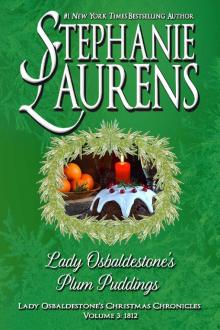 Lady Osbaldestone’s Plum Puddings: Lady Osbaldestone’s Christmas Chronicles Volume 3
Lady Osbaldestone’s Plum Puddings: Lady Osbaldestone’s Christmas Chronicles Volume 3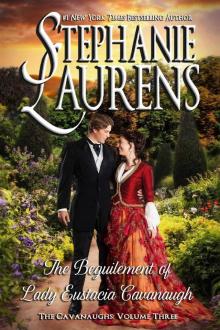 The Beguilement of Lady Eustacia Cavanagh: The Cavanaughs Volume 3
The Beguilement of Lady Eustacia Cavanagh: The Cavanaughs Volume 3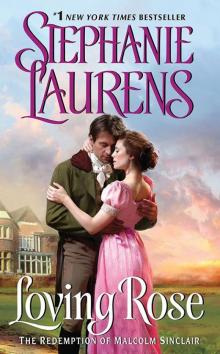 Loving Rose: The Redemption of Malcolm Sinclair (Casebook of Barnaby Adair)
Loving Rose: The Redemption of Malcolm Sinclair (Casebook of Barnaby Adair)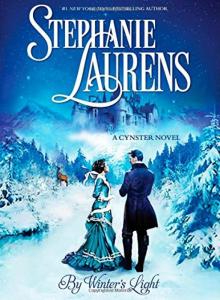 By Winter's Light
By Winter's Light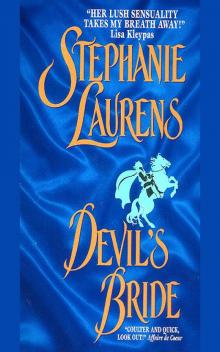 Devil's Bride
Devil's Bride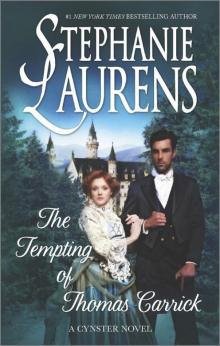 The Tempting of Thomas Carrick
The Tempting of Thomas Carrick![Cynster [22.00] A Match for Marcus Cynster Read online](http://i1.bookreadfree.com/i/03/16/cynster_[22_00]_a_match_for_marcus_cynster_preview.jpg) Cynster [22.00] A Match for Marcus Cynster
Cynster [22.00] A Match for Marcus Cynster All About Love c-6
All About Love c-6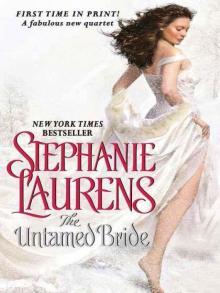 Cobra 01 The Untamed Bride
Cobra 01 The Untamed Bride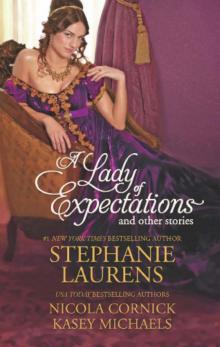 A Lady of Expectations and Other Stories
A Lady of Expectations and Other Stories By Winter's Light_A Cynster Novel
By Winter's Light_A Cynster Novel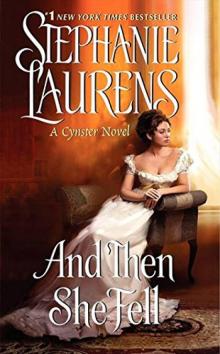 And Then She Fell
And Then She Fell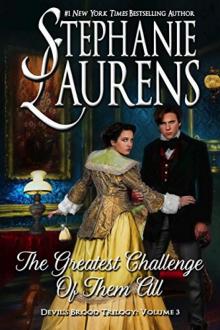 The Greatest Challenge of Them All
The Greatest Challenge of Them All The Edge of Desire
The Edge of Desire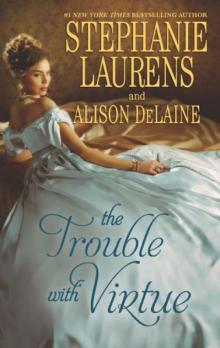 The Trouble With Virtue: A Comfortable WifeA Lady by Day
The Trouble With Virtue: A Comfortable WifeA Lady by Day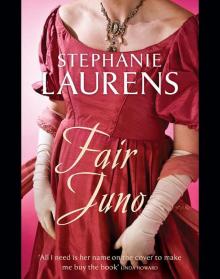 Fair Juno
Fair Juno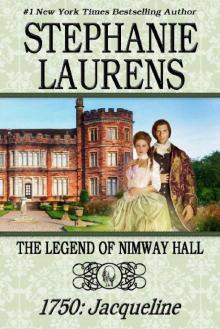 THE LEGEND OF NIMWAY HALL: 1750 - JACQUELINE
THE LEGEND OF NIMWAY HALL: 1750 - JACQUELINE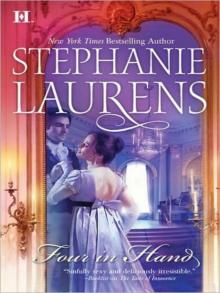 Four In Hand
Four In Hand The Reckless Bride
The Reckless Bride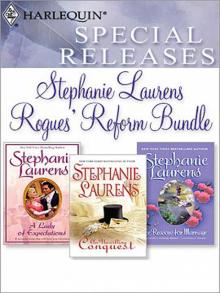 Stephanie Laurens Rogues' Reform Bundle
Stephanie Laurens Rogues' Reform Bundle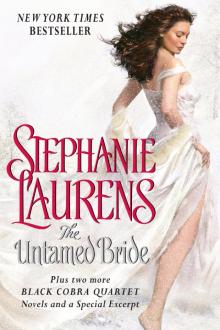 The Untamed Bride Plus Black Cobra 02-03 and Special Excerpt
The Untamed Bride Plus Black Cobra 02-03 and Special Excerpt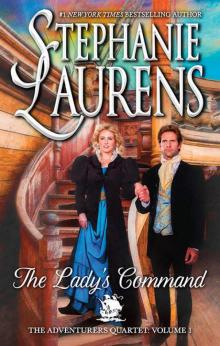 The Lady's Command (Adventurers Quartet #1)
The Lady's Command (Adventurers Quartet #1)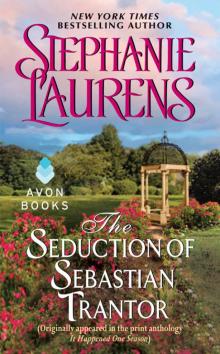 The Seduction of Sebastian Trantor
The Seduction of Sebastian Trantor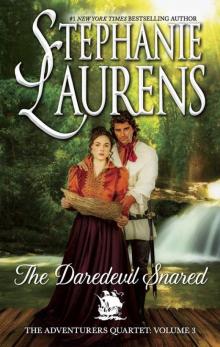 The Daredevil Snared (The Adventurers Quartet Book 3)
The Daredevil Snared (The Adventurers Quartet Book 3)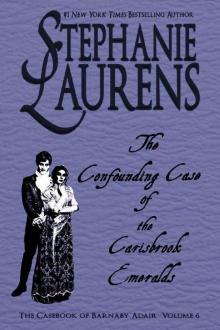 The Confounding Case Of The Carisbrook Emeralds (The Casebook of Barnaby Adair 6)
The Confounding Case Of The Carisbrook Emeralds (The Casebook of Barnaby Adair 6)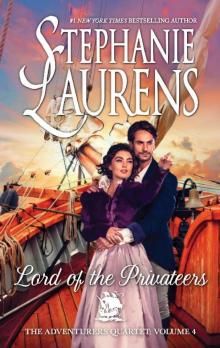 Lord of the Privateers (The Adventurers Quartet)
Lord of the Privateers (The Adventurers Quartet)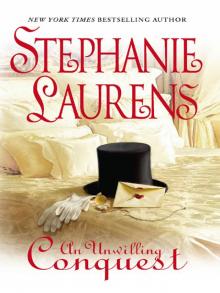 An Unwilling Conquest
An Unwilling Conquest Brazen Bride
Brazen Bride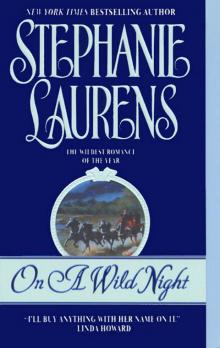 On a Wild Night
On a Wild Night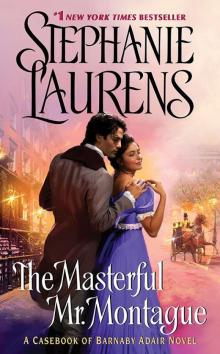 The Masterful Mr. Montague: A Casebook of Barnaby Adair Novel
The Masterful Mr. Montague: A Casebook of Barnaby Adair Novel Lord of the Privateers
Lord of the Privateers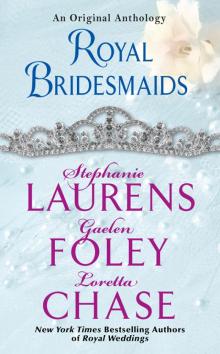 Royal Bridesmaids
Royal Bridesmaids Beyond Seduction
Beyond Seduction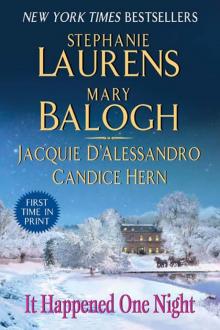 It Happened One Night
It Happened One Night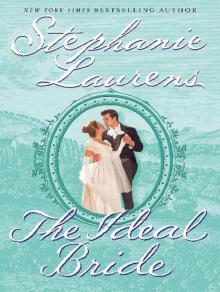 The Ideal Bride
The Ideal Bride The Promise in a Kiss
The Promise in a Kiss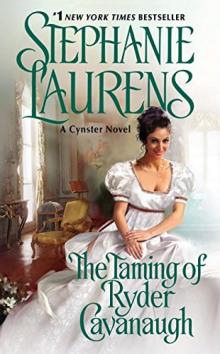 The Taming of Ryder Cavanaugh
The Taming of Ryder Cavanaugh The Ideal Bride c-12
The Ideal Bride c-12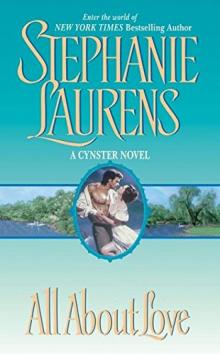 All About Love
All About Love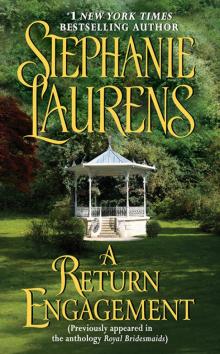 A Return Engagement
A Return Engagement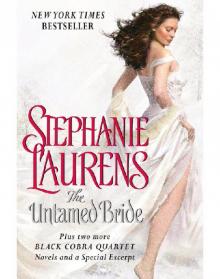 The Untamed Bride Plus Two Full Novels and Bonus Material
The Untamed Bride Plus Two Full Novels and Bonus Material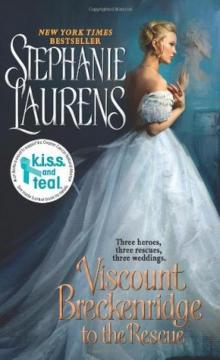 Viscount Breckenridge to the Rescue
Viscount Breckenridge to the Rescue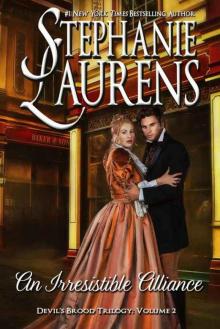 An Irresistible Alliance (Cynsters Next Generation Novels Book 5)
An Irresistible Alliance (Cynsters Next Generation Novels Book 5)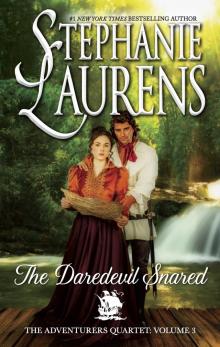 The Daredevil Snared
The Daredevil Snared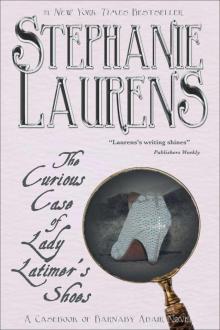 The Curious Case of Lady Latimer's Shoes: A Casebook of Barnaby Adair Novel
The Curious Case of Lady Latimer's Shoes: A Casebook of Barnaby Adair Novel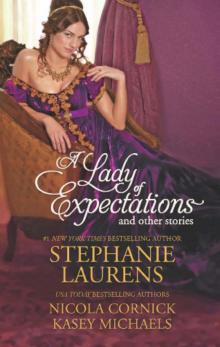 A Lady of Expectations and Other Stories: A Lady of ExpectationsThe Secrets of a CourtesanHow to Woo a Spinster
A Lady of Expectations and Other Stories: A Lady of ExpectationsThe Secrets of a CourtesanHow to Woo a Spinster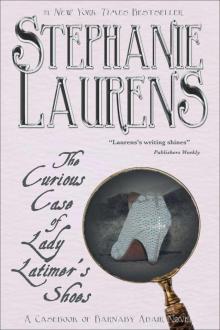 The Curious Case of Lady Latimer's Shoes: A Casebook of Barnaby Adair Novel (The Casebook of Barnaby Adair)
The Curious Case of Lady Latimer's Shoes: A Casebook of Barnaby Adair Novel (The Casebook of Barnaby Adair)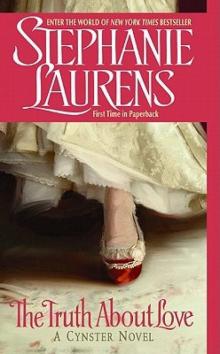 The Truth About Love
The Truth About Love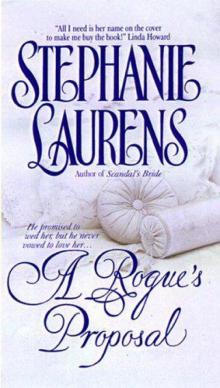 A Rogue's Proposal
A Rogue's Proposal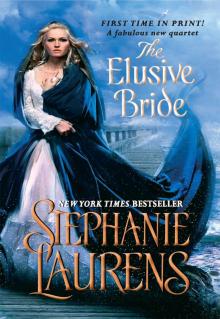 The Elusive Bride
The Elusive Bride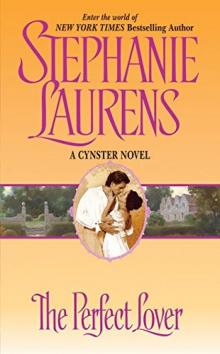 The Perfect Lover
The Perfect Lover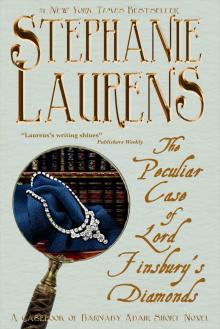 The Peculiar Case of Lord Finsbury's Diamonds: A Casebook of Barnaby Adair Short Novel
The Peculiar Case of Lord Finsbury's Diamonds: A Casebook of Barnaby Adair Short Novel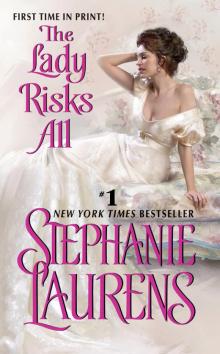 The Lady Risks All
The Lady Risks All The Murder at Mandeville Hall: The Casebook of Barnaby Adair: Volume 7
The Murder at Mandeville Hall: The Casebook of Barnaby Adair: Volume 7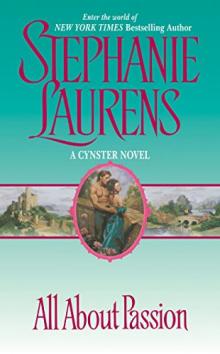 All About Passion
All About Passion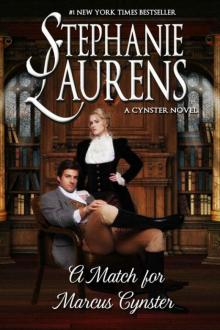 A Match for Marcus Cynster
A Match for Marcus Cynster By Winter's Light: A Cynster Novel (Cynster Special Book 2)
By Winter's Light: A Cynster Novel (Cynster Special Book 2)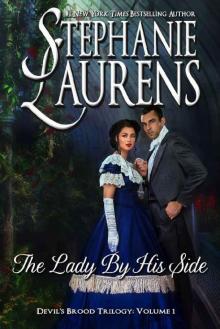 The Lady By His Side
The Lady By His Side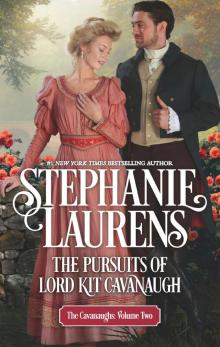 The Pursuits of Lord Kit Cavanaugh
The Pursuits of Lord Kit Cavanaugh Tangled Reins
Tangled Reins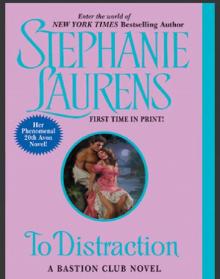 To Distraction
To Distraction A Rake's Vow
A Rake's Vow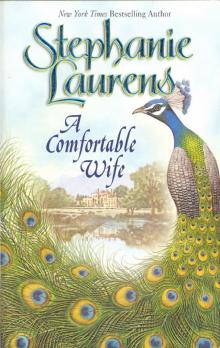 A Comfortable Wife
A Comfortable Wife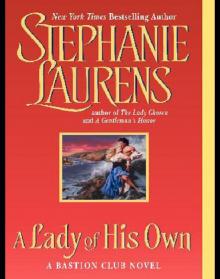 A Lady of His Own bc-3
A Lady of His Own bc-3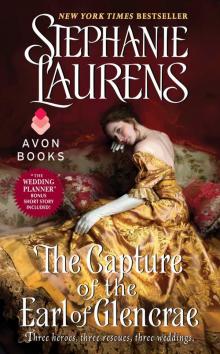 The Capture of the Earl of Glencrae
The Capture of the Earl of Glencrae Scandals Bride c-3
Scandals Bride c-3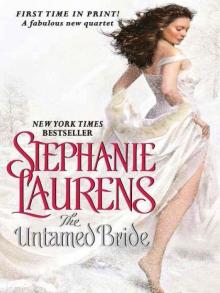 Untamed Bride
Untamed Bride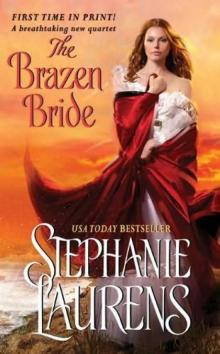 The Brazen Bride
The Brazen Bride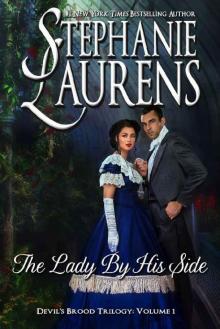 The Lady By His Side (Cynsters Next Generation Novels Book 4)
The Lady By His Side (Cynsters Next Generation Novels Book 4)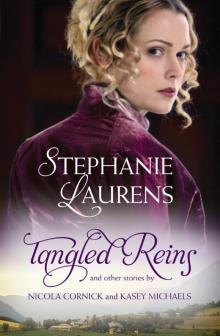 Tangled Reins and Other Stories
Tangled Reins and Other Stories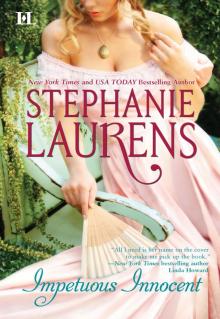 Impetuous Innocent
Impetuous Innocent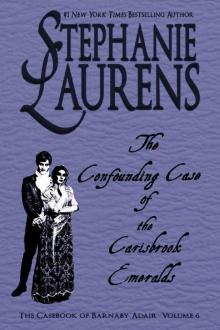 The Confounding Case Of The Carisbrook Emeralds
The Confounding Case Of The Carisbrook Emeralds Stephanie Laurens - B 6 Beyond Seduction
Stephanie Laurens - B 6 Beyond Seduction What Price Love?
What Price Love?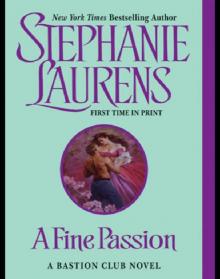 A Fine Passion
A Fine Passion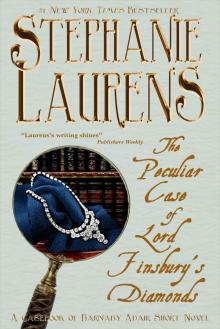 The Peculiar Case of Lord Finsbury's Diamonds: A Casebook of Barnaby Adair Short Novel (The Casebook of Barnaby Adair)
The Peculiar Case of Lord Finsbury's Diamonds: A Casebook of Barnaby Adair Short Novel (The Casebook of Barnaby Adair) Where the Heart Leads
Where the Heart Leads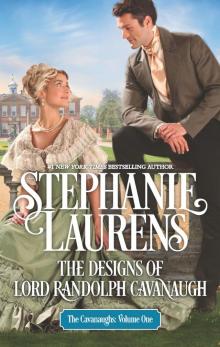 The Designs of Lord Randolph Cavanaugh
The Designs of Lord Randolph Cavanaugh A Secret Love c-5
A Secret Love c-5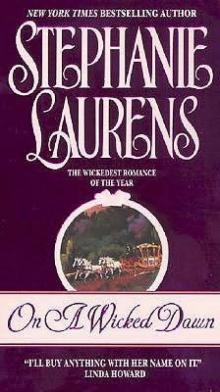 On a Wicked Dawn c-10
On a Wicked Dawn c-10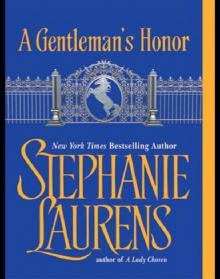 A Gentleman's Honor
A Gentleman's Honor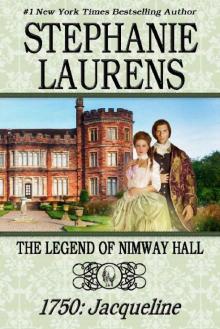 THE LEGEND OF NIMWAY HALL_1750_JACQUELINE
THE LEGEND OF NIMWAY HALL_1750_JACQUELINE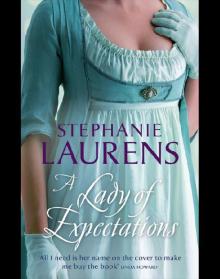 A Lady of Expectations
A Lady of Expectations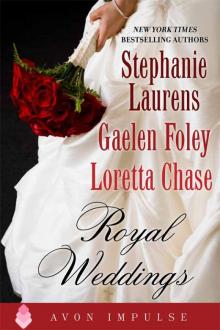 Royal Weddings: An Original Anthology
Royal Weddings: An Original Anthology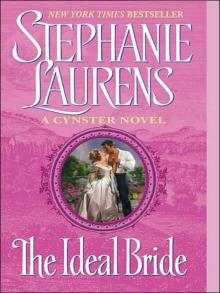 The Ideal Bride (Cynster Novels)
The Ideal Bride (Cynster Novels) Mastered by Love
Mastered by Love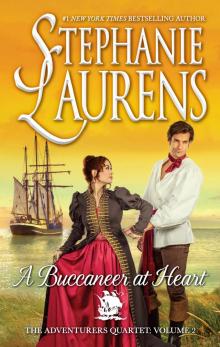 A Buccaneer at Heart
A Buccaneer at Heart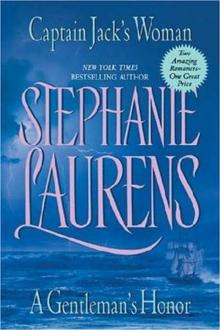 Captain Jack’s Woman / A Gentleman's Honor
Captain Jack’s Woman / A Gentleman's Honor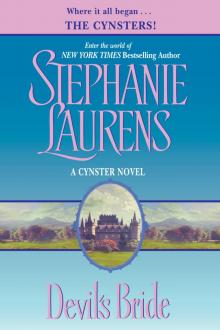 Devil's Bride with Bonus Material
Devil's Bride with Bonus Material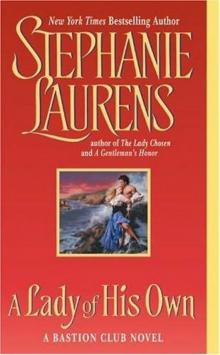 A Lady of His Own
A Lady of His Own A Secret Love
A Secret Love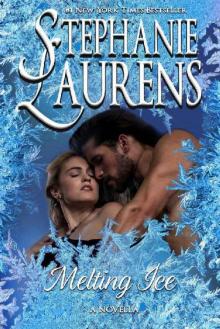 Melting Ice
Melting Ice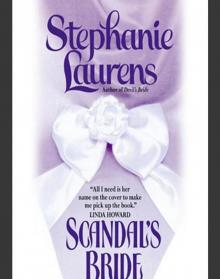 Scandal's Bride
Scandal's Bride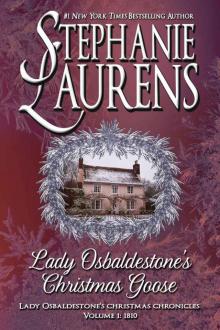 Lady Osbaldestone’s Christmas Goose
Lady Osbaldestone’s Christmas Goose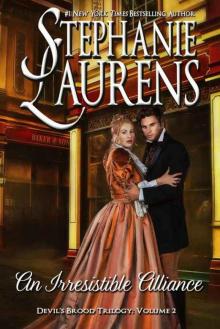 An Irresistible Alliance
An Irresistible Alliance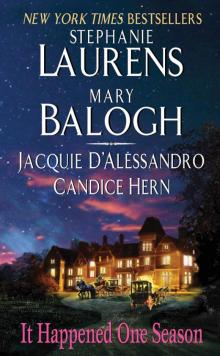 It Happened One Season
It Happened One Season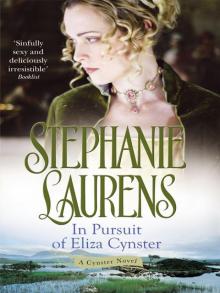 In Pursuit Of Eliza Cynster
In Pursuit Of Eliza Cynster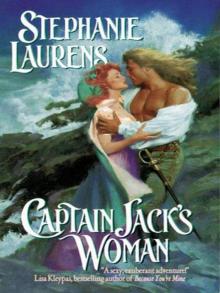 Captain Jack's Woman
Captain Jack's Woman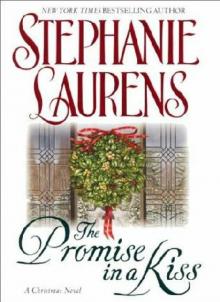 The promise in a kiss c-8
The promise in a kiss c-8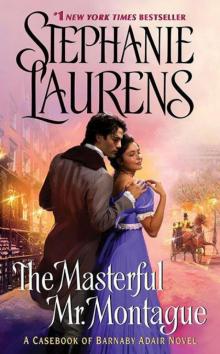 The Masterful Mr. Montague
The Masterful Mr. Montague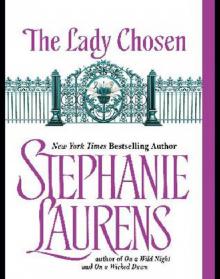 The Lady Chosen
The Lady Chosen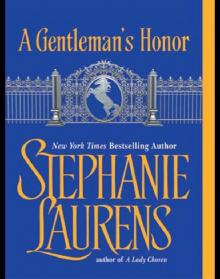 A Gentleman's Honor bc-2
A Gentleman's Honor bc-2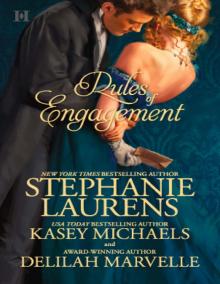 Rules of Engagement: The Reasons for MarriageThe Wedding PartyUnlaced (Lester Family)
Rules of Engagement: The Reasons for MarriageThe Wedding PartyUnlaced (Lester Family) Secrets of a Perfect Night
Secrets of a Perfect Night The Taste of Innocence
The Taste of Innocence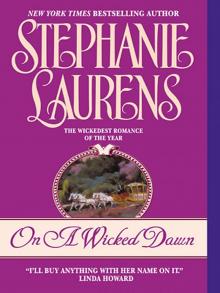 On A Wicked Dawn
On A Wicked Dawn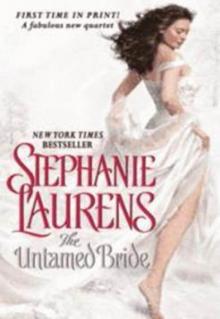 The Untamed Bride
The Untamed Bride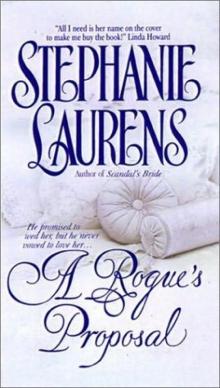 A Rogues Proposal c-4
A Rogues Proposal c-4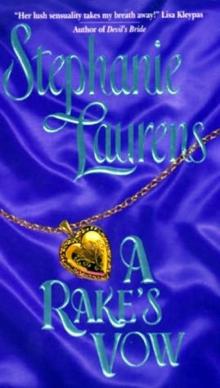 Rakes Vow c-2
Rakes Vow c-2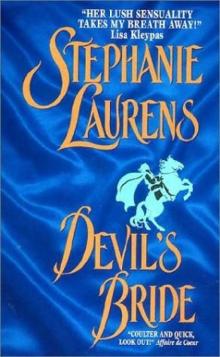 Devils Bride c-1
Devils Bride c-1 Hero, Come Back
Hero, Come Back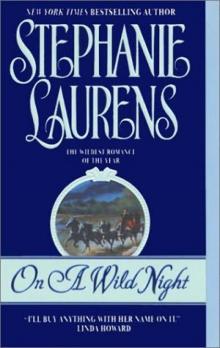 On a Wild Night c-8
On a Wild Night c-8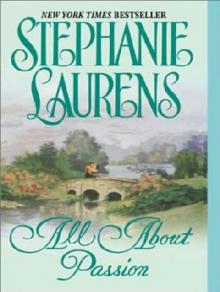 All About Passion c-7
All About Passion c-7